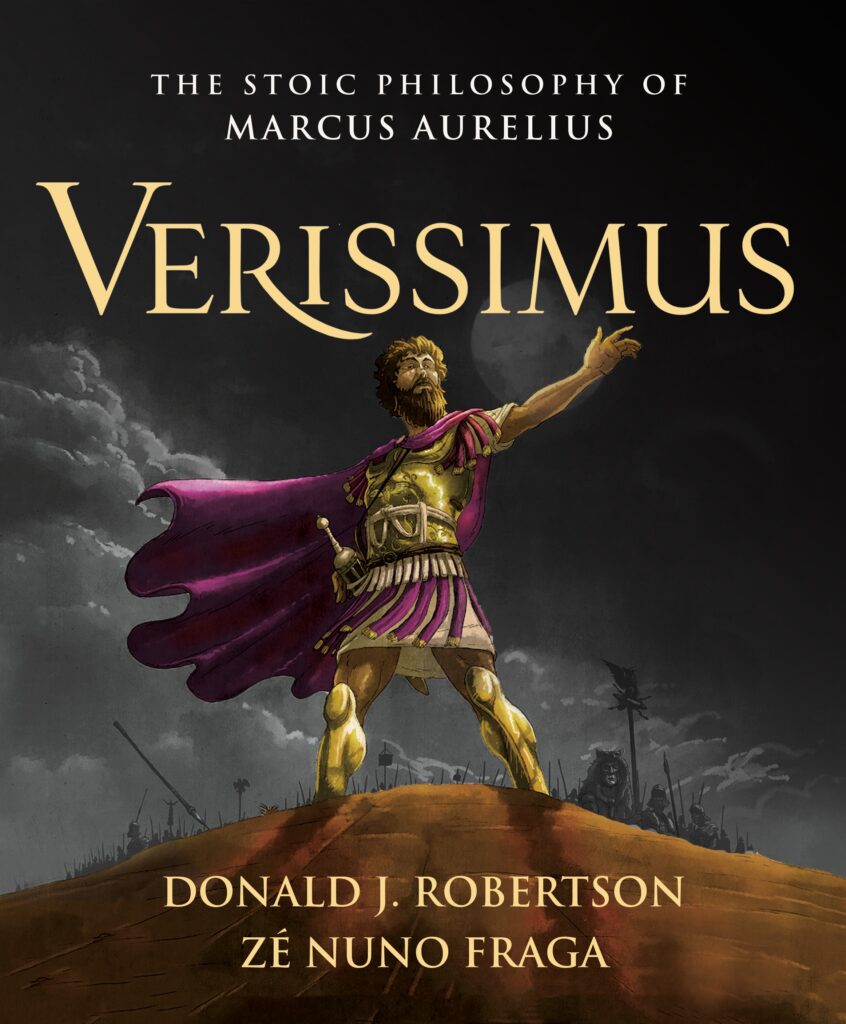
Author, therapist, philosopher, and bon vivant Donald Robertson was kind enough to answer our questions. His new graphic novel, “Verissimus,” is published on July 12–buy it! https://www.amazon.com/Verissimus-Stoic-Philosophy-Marcus-Aurelius/dp/1250270952 or wherever you buy books.
1. What led you to embrace Stoic philosophy?
Well, after completing my first degree in philosophy at Aberdeen University (a long time ago!) I started training in counselling and psychotherapy. That was because people kept telling me philosophy was useless. I wanted to prove them wrong by making at least some use of my philosophy training to help others, and I figured that doing therapy maybe had some overlap with doing philosophy. I started off trying to combine existential philosophy with psychoanalytic therapy but, honestly, that seemed like a bit of a dog’s breakfast to me, and of no use to anyone. So pretty soon I abandoned that approach and started looking for an alternative – then I discovered Stoicism! Stoicism is one of the major schools of ancient philosophy that tends to be almost completely ignored in undergraduate philosophy curricula. I’d studied Plato and Aristotle but not the Stoics. I discovered right away that modern cognitive-behavioural therapy (CBT) was inspired by Stoicism and suddenly had an “aha!” moment. That was, cough, roughly 25 years ago, I guess, and I’ve never looked back. I found Stoicism much more practical and down-to-earth as a philosophy and it seemed easy to talk to my clients about how it complemented the CBT that we were doing in sessions. So I first embraced Stoicism as a way of helping other people but over the years I also found it helped me a lot in my personal life, and professionally – being a therapist is a pretty stressful job sometimes! Now I feel like Stoicism has gradually changed my character over the years. I would be a different person, for instance, if I hadn’t read Marcus Aurelius.
2. What led you to write Verissimus, a graphic novel about Marcus Aurelius?
It bugged me that there wasn’t more philosophy in Gladiator, the movie. Seriously, that’s one of the reasons. I met quite a few people who told me they saw Richard Harris playing Marcus Aurelius in Gladiator, looked him up on Wikipedia, and discovered the Meditations. (So maybe we have Russell Crowe to thank for a generation of Stoics!) I thought it would be cool if there was just a bit more Stoicism in an epic movie like that, as it would encourage even more people to investigate the philosophy. The opportunity came up by chance after I was contacted by Zé Nuno Fraga, a Portuguese illustrator who had recently completed a graphic novel adaptation of Aristophanes’ satire The Assemblywomen. I’d already written several books about Stoicism but I guess I felt that there might be a different way, maybe a better way, to show people what Stoicism was all about. There are a couple of common misconceptions about Stoicism that linger stubbornly – that Stoics are cold fish and unemotional, that they’re passive and accept adversity like a total doormat. You can argue that’s not what the texts say but it’s tedious doing that when the wrong ideas are deeply entrenched. It’s much easier just to point to real life Stoic and say: Hey, look at this guy then, he’s a Stoic and he’s got emotions and he also fights for what he believes in, right? It’s easier just to show people an example, like Marcus Aurelius.
3. You travel a lot. Seneca was skeptical about the benefits of travel and wrote “You need a change of soul rather than a change of climate.” Was he right?
I do. It’s not entirely deliberate. I didn’t travel for most of my life. I came from a poor family and I’d barely left my home town until I was about nineteen. As an adult, I always felt I was too busy to go on holiday. It was only a few years ago that I started to travel a lot. I think Seneca was half right. Often we travel to escape ourselves, and it can be a form of distraction. We carry ourselves with us, though, wherever we go, as Seneca said. On the other hand, I think travel can definitely broaden your mind. There’s a very serious point here… One of our biggest psychological problems is that we identify so much with our opinions that we lose all perspective on them. Modern CBT calls that “verbal fusion”. We confuse opinion with reality, as if ours is the only way of looking at things. We get trapped by our own tunnel vision – it’s like being in a hypnotic trance. Sometimes we need another person, like a therapist, to come along and ask us difficult questions, that can make us take a step back and notice how our thinking is shaping our experience of life, and maybe how that’s causing problems for us. If we’re open to learning about other cultures, though, travel can have a similar effect. We can learn that people in other countries think differently, see things differently, and feel differently. Maybe they have different values and priorities from the ones we take for granted. If we’re willing to learn from that experience, it can be enough, sometimes, to snap us out of the trance. Also, the countries we live in tend to indoctrinate us, for political reasons or whatever, into believing stuff about other parts of the world that’s often a load of nonsense. When we meet people from different countries it can open our eyes and enable us to question our own culture more objectively, from an outside perspective.
4. As a proud Scotsman, would you say the Scots are naturally inclined to Stoicism? Why or why not?
My DNA test says I’m 99% Scottish but I haven’t lived there for about three decades. I feel a bit more “cosmopolitan” now, in the original sense of the word: a citizen of the world. Everyone else still thinks I’m 100% Scottish, though! The Protestant Reformation brought Calvinism to Scotland, which introduced very Stoic-like attitudes to the religious culture of my homeland. In a way, though, I was first introduced to Stoicism by Robert (“Rabbie”) Burns, our national bard. I was born in the town of Ayr, in the heart of Burns country, so we were made to learn his poems at school. It took me a while to appreciate Burns but I gradually began to notice Stoic-sounding themes in his poetry, such as the fleeting nature of pleasure, the value of friendship, the fickle nature of fortune, being content with simple things in life, and so on.
Contented with little and joyous with more,
Whenever I meet with Sorrow and Care,
I gave them a slap, as they’re creeping along,
With a cup o’ good ale and an auld Scottish song. – Contented with Little, Burns
He could have got these ideas by reading Latin poetry. However, Burns happens to have been good friends with a certain Dugald Stewart, professor of moral philosophy at Edinburgh University, who was a big fan of the ancient Stoics. So I think Stoicism filtered down to me through Scottish Protestantism and the poetry of Robert Burns! Also, I think that in order to enjoy Scottish whisky you need to learn to control your facial expression and emotions.
5. When was the last time you screamed your lungs out, for any reason?
When I was born. Although I came pretty close about a year ago in Greece after I stood on a sea urchin and had to go to hospital to have its spines surgically removed from my foot. I can honestly say that’s one of the most painful things I’ve ever experienced. I told the doctor: “I’m going to scream out loud but just keep going!” (She said it had gotten in really deep somehow and she had a hard time cutting it out.) Then I did it again more recently but it didn’t hurt at all the second time around. I wouldn’t recommend standing on one of those things, though. On the positive side, following some advice from Marcus Aurelius, I can now tell myself when I go to the dentist: “Sure, this might hurt a bit but it’s a walk in the park compared to the thing with the sea urchin!”
Bonus: What question should I have asked, and what’s the answer?
Nobody ever asks about my new tattoo! It says Ouden deinon peponthas, in ancient Greek, which means “Nothing terrible has happened to you.” Zeno, the founder of Stoicism, started off training as a Cynic philosopher under a teacher called Crates of Thebes. Zeno was apparently kind of shy or socially anxious so Crates instructed him to carry a bowl of lentil soup through the kerameikos, an ancient cemetery near the slopes of the Acropolis where prostitutes used to hang out. Zeno felt so stupid and was so ashamed that he cheated and hid the bowl under his robe. Crates spotted him and smashed it with his staff to teach his student a lesson about getting over himself. The lentil soup went all over Zeno, and dribbled down his bare legs. He was freaking out, understandably, but Crates said: “Nothing terrible has happened to you.” That’s the lesson. Apparently that made a big impression on Zeno, and he went on to invent Stoic philosophy. It’s only soup, buddy, not the end of the world!


bravo, cheers to my favorite Wise Guy–great piece.!